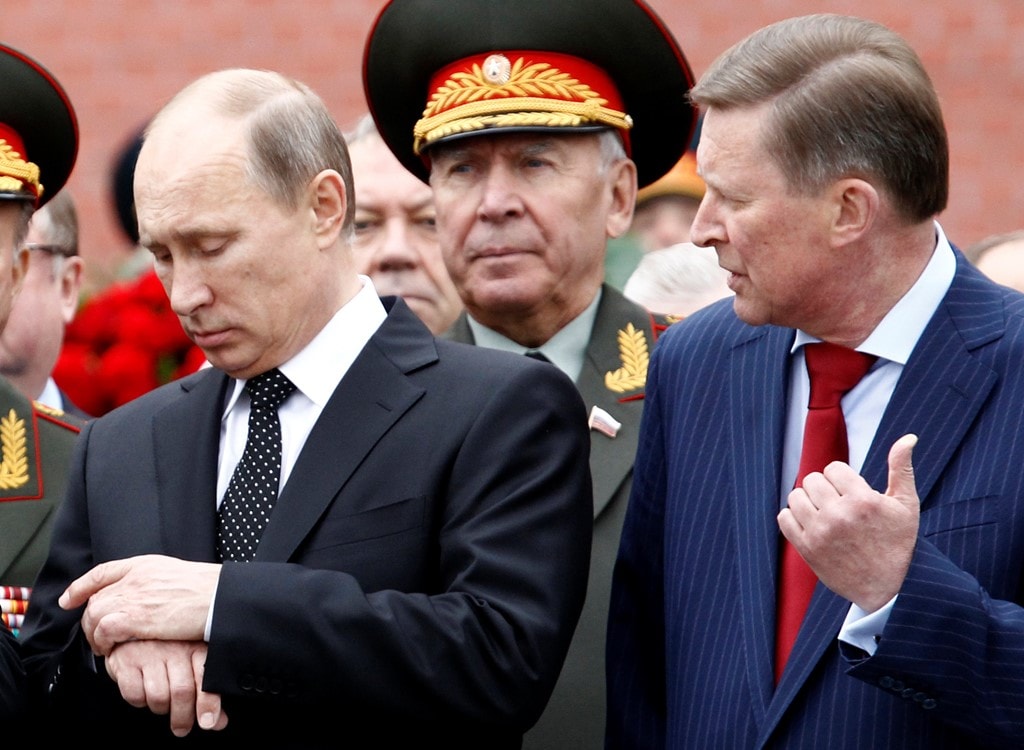Kremlin personnel changes: What is Putin plotting?
The personnel changes in the Kremlin seem to signal major changes. But it is unclear what the ultimate purpose of the changes is.
 |
| Mr. Putin has removed his long-time close ally Sergei Ivanov (right) after 17 years of association. Photo: Reuters |
On August 12, when President Vladimir Putin fired Sergei Ivanov, the powerful Kremlin chief of staff and his close ally for 17 years, the Russian president's office only released a short video thanking Mr. Ivanov.
Speculation abounded about the dismissal of the man who was a former defense minister and presidential candidate to replace Mr. Putin. Nothing is random in the Russian political system.
“We have a system that can do anything for no reason,” Gleb Pavlovsky, a former Kremlin adviser, told the Economist. “Everything is like a black box.”
Sensitive time for the Kremlin
Mr. Ivanov, like Mr. Putin, is a former KGB agent from St. Petersburg, and is considered one of the most powerful figures in Russia — perhaps second only to Russian President Vladimir Putin.
The decision to replace him with the young 44-year-old Anton Vaino is very similar to the recent pattern of personnel replacements: Putin removes old close comrades and replaces them with younger loyalists.
“People who don’t fit Putin’s vision are leaving,” said Aleksei Chesnakov, a former presidential office official. But, he added, “probably no one outside the president knows what the purpose of this is.”
The timing of the change comes at a delicate time. Parliamentary elections are due in mid-September and Russia’s economy is fragile. Tensions with Ukraine are escalating after Russia accused Kiev of planning an attack on Crimea.
Russia is also expanding its presence in the Middle East by attacking Syria from bases in Iran.
Some observers are speculating whether Putin wants early presidential elections next year? To gain more support to continue economic reforms. Or is he preparing to step down in 2018? Will Medvedev, who succeeded Putin in 2008, return to power? Or is Putin looking for a new heir?
“Ultimately, we still don’t know what the ultimate goal is,” said Mark Galeotti, a longtime Russia expert. But there is clearly a trend of personnel turnover emerging in Russian politics.
Eliminate old power figures
Last year, the head of Russian railways, Vladimir Yakunin, a Putin ally known for his lavish lifestyle, was removed. Earlier this year, Putin created a national guard and removed several longtime allies from the top positions of the anti-drugs and immigration services.
New figures have also taken up positions in powerful agencies such as the Federal Security Service (FSB). In July, Andrei Belyaninov, the head of the customs service, was ousted after the FSB searched his home and found cash.
As budgets become increasingly tight in Russia, blatant corruption is no longer acceptable, observers say.
For Mr. Ivanov, the drowning of his son in 2014 may have worn him down. His seat on the powerful National Security Council has led observers to believe that he may not yet be in a position to directly confront Mr. Putin.
But there have been reports that he has fallen out of the president’s inner circle in recent times. Some say Mr Putin no longer needs an independent adviser, an old friend who can speak on an equal footing with him.
In any case, removing old comrades could help refresh Russia's leadership and intimidate any figures with opposing ideas.
In a controlled political system, Mr Putin’s system is seen as ineffective in creating new, competent political classes. And the longer Mr Putin stays in power, the more worried he becomes about personnel issues.
Putin has created new channels for recruiting new personnel since returning to power in 2012, according to analyst Nikolai Petrov. The United Russia party primaries earlier this year were seen as “cultivating new elements,” said Andrei Kolesnikov of the Carnegie Moscow Institute.
The generation of leaders are former bodyguards
President Putin has even voiced his support for a gifted school for children in Sochi.
But even in his appointments, Mr Putin is said to have targeted figures he has known for a long time. This year, he appointed former bodyguards as governors of three Russian provinces.
Another former bodyguard, Victor Zolotov, was appointed head of the national guard.
A new generation of “Putinians” is emerging, whose careers are seen as being beholden to the powerful president. They are “loyal, efficient, and uninfluenced by ideology.”
The new Kremlin chief of staff, Vaino, is not a bodyguard but has spent much of his career working alongside Putin. He initially worked in the Kremlin reception area, monitoring the president’s schedule, accompanying him on official trips and holding his umbrella when needed.
Oleg Matveychev, a former Kremlin official, said Mr. Vaino had a reputation for being “strict, upright and well-dressed.”
According to Zing.vn
| RELATED NEWS |
|---|

